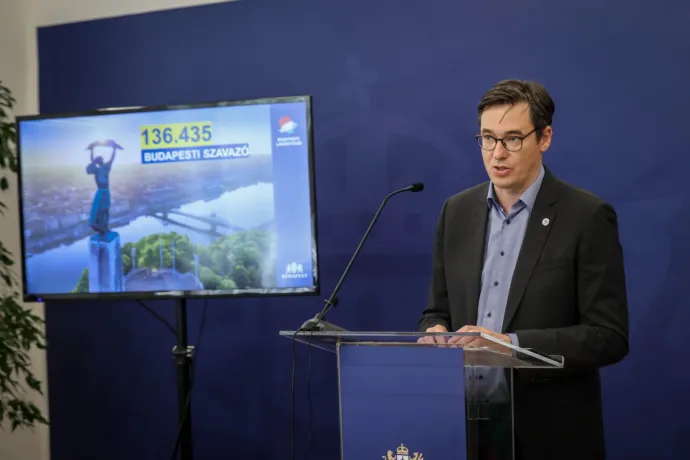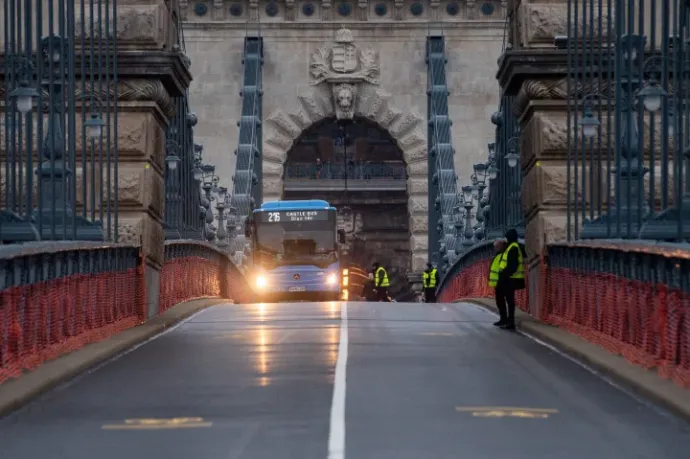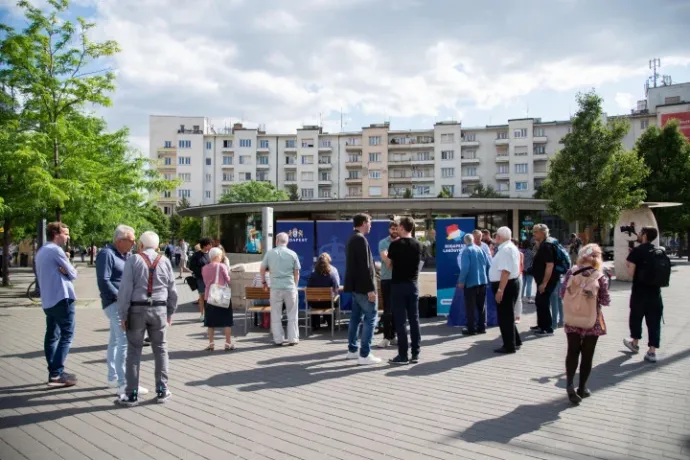
Almost 80 percent of Budapest residents would maintain the current traffic regime on the Chain Bridge, i.e. only taxis, buses, motorbikes and cyclists will be allowed to use the bridge in the future – said Mayor Gergely Karácsony, presenting the results of the online survey called Budapest Residents' Assembly, which was completed over the weekend. In addition to the future of the Chain Bridge traffic order, more than 136,000 Budapest residents voted on three other less specific issues, representing more than 9% of those eligible to vote. "The people of Budapest have chosen the future", said Karácsony.
79% of respondents voted in favour of the current car-free traffic order on the renovated Chain Bridge. Since mid-December, buses, taxis, motorbikes and micro-mobility vehicles have been allowed to travel freely on the bridge, part of which is still undergoing renovation work, but cars have not been allowed back and the decision means that they will not be allowed back in the future. The mayor said that he would instruct the Budapest Transport Centre (BKK) to finalise the current, temporary traffic order on the bridge. Karácsony had previously promised that if the car-free bridge remains, the surrounding squares (Széchenyi and Clark Ádám) would be renewed, but there are no funds for that at the moment and part of the area does not even belong to the Municipality of the capital.
In addition to the future of the Chain Bridge traffic order, the people of Budapest were asked what they would consider fair: if the current city government paid as much to the government in taxes and contributions as the previous one, or "if the government's more than tenfold increase in the levies imposed on the capital would remain". Here a large majority, 91 percent, voted against increased contributions, so they do not want the capital to pay more. We wrote in detail here about the economic situation of the capital and the roughly HUF 200 billion missing reserves that Fidesz is holding the current city government accountable for.
There were two options to choose from on another budget issue: the capital should either suspend the payment of government levies (termed ‘solidarity contribution’) or reduce the number of public transport services. Unsurprisingly, a significant proportion of the voters at the residents' meeting, 88% to be precise, did not want fewer Combino trams on the Nagykörút (Grand Boulevard) passes through or less frequent metro 3 services.

There was also a question about the six billion forints promised by the government for the Chain Bridge, but not yet transferred: should the government transfer the money, or should the government withdraw its decision and not transfer it? A clear majority of participants – 93 percent – thought that the government should pay the six billion that it had previously promised to renovate the bridge. In this article, we discussed whether the capital is entitled to the six billion for the Chain Bridge and whether the Mayor and the municipality would be able to collect it.
1.4 million Budapest residents over the age of 14 were eligible to fill in the questionnaire of the Residents' Assembly, of which only 9% of those eligible to answer sent their responses, that is, 136 ,435 residents.
At the press conference announcing the results, the Mayor said that this Residents' Assembly was the first time that all Budapest residents had been consulted directly. He did not want to compare turnout figures, but said the decision of 136,000 people could be part of a "change of political culture ".
According to the decisions taken at the Residents' Assembly, Gergely Karácsony will send a payment request to the Ministry of Construction, as the amount promised by the government for the Chain Bridge is included in their budget. A similar letter will also be sent to the Ministry of Finance. "I remind you that until the end of the administrative lawsuit between us, the Municipality of the capital will not pay the solidarity contribution," he said. The mayor said that as long as the administrative procedure is ongoing, the ministry cannot collect money from Budapest. Karácsony also sent a letter to Prime Minister Viktor Orbán to inform him of the results, adding that he is sending the letter to him because the Council for Public Development of the Capital, which serves as a consultative body, currently has no head.
"This is the opposite of the government's national consultation. These issues are real issues, these are the issues of the city, the most serious dilemmas facing the city government."
– said Karácsony in response to criticism that the Residents' Assembly resembles the government's consultation. On the turnout figures, he said it was a great thing that 136,000 people had opened the letter sent by the capital and had taken up the issue. The current Residents' Assembly, incidentally, cost the capital roughly 130 million forints.
The mayor said this result "imposes a clear obligation on all decision-makers". In a Facebook post on Monday, Karácsony compared the response rate to the only other online national consultation: "The participation rate in the first Budapest Residents' Assembly was almost twice as high as the 5 percent at the government's online national consultation," he wrote.
The questionnaire was originally due to be completed by 11 June, but because of a delay in sending out the codes distributed by post, the Residents' Assembly was extended by a week. At the time, the mayor cited the high level of interest, with around 100,000 people having filled in the questionnaire by that date, incidentally.

The survey called the Residents' Assembly, was announced by Gergely Karácsony at the end of April. The basic questions of the Budapest Residents' Assembly were later supplemented by questions about the Chain Bridge. In early May, Budapest Transport Centre announced its position that it would propose a car-free Chain Bridge, but it was announced that it would be the voters of the questionnaire, not the transport operator, nor the Budapest Municipal Assembly, who would decide on the issue.
BKK also organised a debate on the traffic order on the Chain Bridge, where Szilárd Ajtay, representing the Automobile Association, said that the current traffic order is a "makeshift solution", and a compromise solution would be needed instead. The renovation started back in March 2021 with the closure of the pedestrian walkways, and the full opening is expected in August this year. The partially renovated Chain Bridge was opened in December last year, but at that time there were no decorative railings on the bridge as the pedestrian section had not yet been completed.
For more quick, accurate and impartial news from and about Hungary, subscribe to the Tele English newsletter!